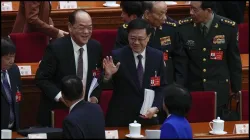Hong Kong introduces new national security draft bill with tougher penalties to stifle dissent
Hong Kong, a booming business hub, has come under the scanner as authorities launched a crackdown on dissent in the semi-autonomous city. This crackdown began after violent pro-democracy protests in 2019 after which several pro-democracy lawmakers have been arrested while others fled abroad.

Hong Kong on Friday published its draft of a new national security law that has reportedly brought tougher penalties for those convicted of sedition or leaking state secrets. The draft includes new laws encompassing treason, espionage and external interference and is being closely watched by foreign diplomats and businesses who fear it could further restrict freedoms in the financial hub already subjected to a China-led crackdown on dissent.
The Legislative Council started debating the bill on Friday amid tight security, and several members of the largely pro-Beijing body told reporters they expected the bill to be passed into law before mid-April. Hong Kong leader John Lee had earlier urged lawmakers to pass the bill as quickly as possible. "The geopolitics have become increasingly complex, and national security risks remain imminent," said a government statement.
The bill includes sentences of up to life imprisonment for treason, insurrection and sabotage, 20 years for espionage and 10 years for crimes linked to state secrets and sedition. Lawyers analysing the draft said some provisions, such as those for sedition and state secrets, are broader and potentially tougher. The Hong Kong bill proposed extending police detention for those arrested, without charge, for up to 14 days with a magistrate's approval and potentially limited access to lawyers, compared to 48 hours currently.
The European Union, in a statement to Reuters, said it had made clear in a diplomatic note its "grave concerns" over the far-reaching provisions in the bill on "external interference" and the law's extra-territorial reach. However, the draft also noted some provisions of rights, such as freedoms of speech, of the press and of association.
Concerns over the national security bill
The draft is seen as the latest step in a crackdown on political opposition that began after the semi-autonomous Chinese city was rocked by violent pro-democracy protests in 2019. Since then, several leading pro-democracy activists have been arrested and others fled abroad.
The proposed law will expand the government's power to stamp challenges to its rule, targeting espionage, disclosing state secrets, and “colluding with external forces" to commit illegal acts among others. On Thursday, an appeals court upheld a conviction for sedition against a pro-democracy activist for chanting slogans and criticising the Beijing-imposed 2020 National Security Law during a political campaign.
Critics say that the proposed law would make Hong Kong even more like mainland China. However, the government said it was necessary to prevent a recurrence of the massive anti-government protests that rocked the city in 2019, insisting it would only affect “an extremely small minority” of disloyal residents.
Some investors said the desire to fast-track the bill was concerning. "The fact they are rushing through article 23 shows concern about public opposition. The business community is going to be unhappy unless there are guard rails protecting individual rights," said Andrew Collier, managing director at Hong Kong-based Orient Capital Research.
Simon Young, a law professor at the University of Hong Kong, also said the broad definitions of crimes, especially those linked to foreign interference and collusion, could prove challenging to firms. "It may well be that businesses or groups that have some connection with foreign governments might fall under the radar as an 'external force'", Young said.
Restrictions on freedom
Hong Kong has been a booming business, academic and media hub for China, but in recent years critics say the rule of law and freedom of information have been undermined. The debate on the Hong Kong bill coincides with a move by China's top lawmakers to create a slew of new national security laws in order to safeguard the mainland's sovereign interests.
The debate on the Hong Kong bill coincides with a move by China's top lawmakers to create a slew of new national security laws in order to safeguard the mainland's sovereign interests. The lawmakers vowed to enact the new laws to "modernise China's system and capacity for national security" while safeguarding sovereign interests, a sign of what some analysts say is a heightened focus on perceived security threats.
They also said they would revise laws on national defence education and cybersecurity this year, according to a work report delivered by the NPCSC's chairman and the Communist Party's third-ranked official, Zhao Leji. The annual legislative plan had an increased focus on national security, in line with Chinese President Xi Jinping's growing focus on preventing internal and external threats in response to intensifying geopolitical competition.
Critics, including media advocacy groups, had earlier called for sedition to be scrapped, noting its potential use to silence freedom of expression and the media. The new bill proposes a jail term of up to three years, up from one year, for possessing a seditious publication and police have the right to search any premise to seize and destroy such material.
Last year, police offered bounties of 1 million Hong Kong dollars ($128,000) on more than a dozen activists living abroad, including former lawmakers Nathan Law and Ted Hui, whom they accuse of colluding with external forces to impose sanctions on Hong Kong and China. Prisoners convicted of national security offenses will not be eligible for sentence reductions until authorities are confident early release would not risk national security.
(with inputs from Reuters, AP)
ALSO READ | India overtakes Hong Kong to become fourth-largest stock market globally
